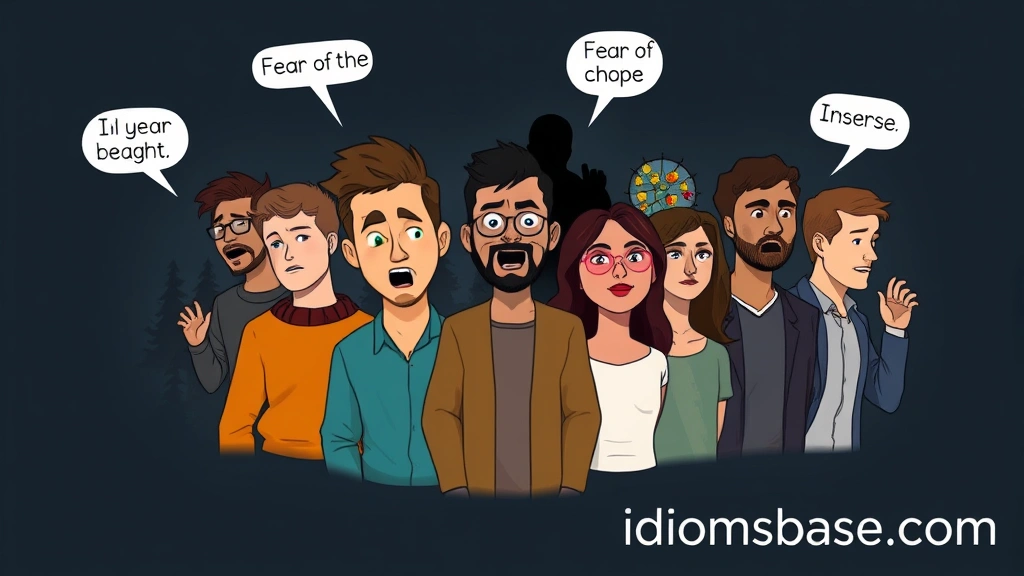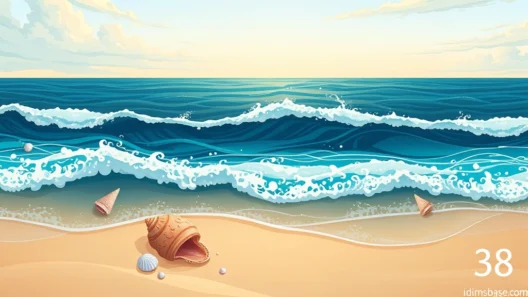Have you ever felt that icy grip of fear, that sudden jolt that makes your heart pound like a drum? Fear is a universal emotion, something we all experience, whether it's a fleeting moment of anxiety or a deep, lingering dread. But how do we truly describe that feeling, that primal instinct that can turn our knees to jelly or make our hair stand on end?
Sometimes, words alone just aren't enough to capture the full spectrum of being scared. That's where metaphors come in! Metaphors are like secret weapons for writers and speakers, allowing us to paint vivid pictures and convey complex emotions in a way that's both powerful and memorable. They help us understand one thing by comparing it to another, often unrelated, thing.
In this exciting exploration, we're diving deep into the world of creative language to uncover 38 fantastic metaphors for "scared." Get ready to expand your vocabulary and discover new ways to express that spine-tingling sensation!
Metaphors for Scared: Feeling the Chill
Let's start with metaphors that evoke a sense of coldness or paralysis, often associated with fear.
The Icy Grip of Fear
- A deer in headlights: Imagine a deer, frozen by the blinding lights of an oncoming car. This metaphor perfectly captures a state of utter paralysis and shock when faced with sudden danger. You're so scared, you can't move!
- Frozen with fear: This one is pretty straightforward, isn't it? It describes a state where fear is so intense, it makes you feel like you've turned to ice, unable to react or escape.
- Blood ran cold: When your blood runs cold, it's not just a chill; it's a profound sense of dread and terror that washes over you, making you feel cold from the inside out.
- A cold sweat: This phrase describes the clammy, chilling perspiration that often accompanies intense fear or anxiety. It's that uneasy dampness that makes you shiver.
- Icy tendrils of dread: Picture a creeping, cold sensation, like thin, icy fingers slowly wrapping around you. This metaphor suggests a fear that gradually takes hold and consumes you.
- A shiver down the spine: This classic image perfectly conveys that sudden, unsettling sensation of fear or unease that makes your hair stand on end.
Metaphors for Scared: Heart-Pounding Terror
These metaphors focus on the physical reactions of fear, especially those related to the heart and breathing.
The Drumbeat of Panic
- Heart in my throat: This vivid image suggests that your heart is beating so hard and fast, it feels like it's trying to escape your chest and jump right out of your mouth!
- Heart pounding like a drum: A simple yet effective metaphor, this describes an incredibly fast and forceful heartbeat, typical of extreme fear or excitement.
- Stomach dropped to my feet: That sudden, unsettling sensation in your gut when you're hit with a wave of fear or shock. It's like your insides are plummeting!
- Butterflies in my stomach: While often associated with nervousness or excitement, intense fear can also manifest as a fluttering, uneasy sensation in your stomach.
- Breath caught in my chest: This describes a moment of shock or terror so intense that you momentarily forget to breathe, or your breath simply hitches.
- My blood ran cold as ice: Similar to "blood ran cold," but with an added emphasis on the extreme coldness, indicating profound terror.
- Jumpy as a cat: Cats are known for their sudden, startled reactions. This metaphor describes someone who is easily frightened or on edge.
- Nerves of steel turned to jelly: When you're usually calm and collected, but fear makes you feel weak and wobbly, this metaphor perfectly captures the transformation.
- A knot in my stomach: This common phrase describes the tight, uncomfortable feeling in your abdomen that often accompanies anxiety or fear.
Metaphors for Scared: Loss of Control

These metaphors highlight the feeling of being overwhelmed or losing control when fear takes over.
Helpless in the Face of Fear
- Paralyzed by fear: Similar to "frozen with fear," this emphasizes the inability to move or act due to overwhelming terror.
- Sweating bullets: When you're so scared or stressed that you're sweating profusely, as if each drop is a heavy bullet.
- White as a ghost: This describes a person whose face has lost all color due to extreme fear or shock, making them appear pale and lifeless.
- A chill to the bone: A deeper, more penetrating cold than just a shiver, suggesting a fear that truly gets under your skin.
- Quaking in my boots: When your whole body is trembling uncontrollably from fear, this metaphor perfectly illustrates the shaking.
- My jaw went slack: A common physical reaction to shock or disbelief, indicating a sudden loss of composure.
- Lost all color in my face: Similar to "white as a ghost," this emphasizes the sudden pallor that fear can induce.
- My heart hammered against my ribs: Another way to describe a very fast and forceful heartbeat, as if your heart is literally trying to break free.
- My hair stood on end: That primal, goosebumps-inducing sensation when you're truly terrified.
- My skin crawled: A creepy, unsettling sensation that suggests discomfort, disgust, or fear.
Metaphors for Scared: The Weight of Fear
These metaphors describe fear as something heavy, oppressive, or consuming.
Crushed by Apprehension

- A dark cloud overhead: This suggests a pervasive sense of dread or impending doom that hangs over you.
- A shadow creeping in: Fear often feels like something insidious and slowly approaching, casting a pall over everything.
- Swallowed by terror: When fear is so overwhelming, it feels like it's consuming you entirely, leaving no room for anything else.
- Weight on my chest: This describes the oppressive, heavy feeling that anxiety or fear can create, making it hard to breathe.
- A cage of fear: Feeling trapped and confined by your anxieties, unable to escape.
- Drowning in dread: When you're overwhelmed by a feeling of deep fear or apprehension, like you're sinking.
- A cold hand clutched my heart: A sudden, sharp feeling of terror that grips you, often unexpectedly.
- My mind went blank: When fear is so intense, it causes a temporary cognitive shutdown, making it impossible to think clearly.
- Every nerve ending screamed: This strong metaphor conveys an intense, overwhelming feeling of fear that affects your entire being.
- The air grew thick with tension: While this describes an atmosphere, it perfectly captures how fear can make the environment feel heavy and oppressive.
- My courage evaporated: Like water turning to vapor, this describes the sudden disappearance of bravery in the face of fear.
- A chill wind blew through me: Similar to "shiver down the spine," but with a more expansive feeling of coldness and unease.
- My knees turned to jelly: The classic image of feeling so weak from fear that your legs feel unsteady and unable to support you.
Key Takeaways
- Metaphors are powerful tools for describing complex emotions like fear.
- They create vivid imagery and make your language more engaging and memorable.
- We explored metaphors that evoke coldness, physical reactions, loss of control, and oppressive feelings.
- Understanding these metaphors can help you better express and understand the nuances of being scared.
Frequently Asked Questions (FAQs)
Q1: What is a metaphor?
A metaphor is a figure of speech that directly compares two unlike things without using "like" or "as." It states that one thing is another, even though it's not literally true, to create a stronger image or understanding. For example, "The world is a stage."

Q2: Why are metaphors important for describing emotions?
Metaphors are crucial for describing emotions because emotions are often abstract. They help us give concrete form to intangible feelings, making them more relatable and understandable. They allow us to paint a richer, more nuanced picture of what we're experiencing.
Q3: How can I use these metaphors in my writing or speaking?
You can use these metaphors to add depth and vividness to your descriptions of fear. Instead of just saying "I was scared," you could say "My heart pounded like a drum" or "I was frozen with fear." This makes your writing more engaging and your communication more impactful.
Q4: Are there any common pitfalls when using metaphors?
Yes, a few things to watch out for! Avoid mixing metaphors (e.g., "He was a pillar of strength, but his courage evaporated like a cloud"). Also, ensure your metaphors are clear and easy for your audience to understand. Don't use a metaphor that's more confusing than the original concept.
Q5: Can I create my own metaphors for "scared"?
Absolutely! The best metaphors are often original and specific to your experience. Think about what fear feels like to you, what it does to your body, or what it reminds you of. For example, "Fear was a tightening vise around my chest." The more you experiment, the more creative your language will become!
Q6: What's the difference between a metaphor and a simile?
The main difference is the use of "like" or "as." A simile compares two things using "like" or "as" (e.g., "He was as brave as a lion"). A metaphor states that one thing is another (e.g., "He is a lion"). Both are powerful tools for comparison!
We hope this journey through 38 metaphors for "scared" has been as thrilling for you as it was for us! Language is a beautiful, ever-evolving thing, and finding new ways to express our deepest emotions is truly a gift. So, the next time you feel that little shiver, try to capture it with a vivid metaphor. What's your favorite way to describe being scared? Share your thoughts and let's keep the conversation going!






